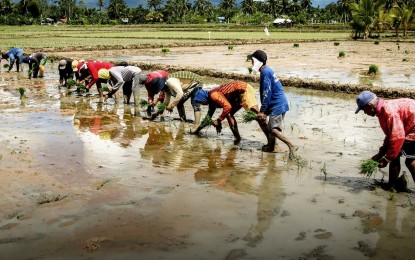
LOAN CONDONATION. A bill condoning the debts farmers incurred in owning lands under the Comprehensive Agrarian Reform Program (CARP) has been filed in Congress. Magsasaka Party-list Rep. Robert Nazal says Thursday (Nov. 3, 2022) condoning loans of the agrarian reform beneficiaries will be the right step in pursuing social justice, as well as provide a stimulus for economic growth. (File photo courtesy of the Department of Agriculture)
MANILA – The Magsasaka Party-list has joined fellow lawmakers’ call for the urgent passage of a bill condoning all the debts farmers incurred in owning lands under the government’s Comprehensive Agrarian Reform Program (CARP).
Once their intra-party legal dispute is settled, the party-list will prioritize pushing for the approval of a House Bill (HB) No. 3490 that aims to erase the unpaid debts of agrarian reform beneficiaries (ARBs) which could play a major role in economic recovery and attaining food security for the country.
“Condoning the debts now of the agrarian reform beneficiaries will not only be a right step in pursuing social justice, but it will also provide a stimulus for an economic growth wherein the country’s agricultural sector will be at the forefront,” Magsasaka Rep. Robert Nazal said Thursday.
“The farmer-beneficiaries will be provided a fresh start and will be released from the bondage from where the law truly intended them to be freed,” he added.
Nazal said the condonation bill is in support of the call of President Ferdinand R. Marcos Jr. in his first State of the Nation Address, appealing to Congress to pass a law that will lift the burden off ARBs to pay their respective loans so they could focus on farming quality and productivity.
The condonation of the existing agrarian reform loan will cover the amount of PHP58.125 billion benefiting around 654,000 agrarian reform beneficiaries and involving a total of 1.18 million hectares of awarded lands.
CARP aims to benefit farmers and other ARBs in at least two ways: availability of credit to be used for the enhancement of their farming endeavors and award of lands to be paid for by them to the Land Bank of the Philippines in 30 annual amortizations at 6 percent per annum.
Nazal said the legislative intent behind CARP was to give farmers the much-needed land and financial resources for them to compete in a global market which would eventually free them from the bondage of soil.
“However, despite the noble intentions, the government currently has a staggering collectible deficit from the foregoing loans on both the land and the credit secured by agrarian reform beneficiaries,” he said.
He also said the collection of the loans has proven to be a challenge over the years and the logistics of reaching out to farmers in far-flung areas contributed to such difficulty.
“Thus, the cost of collection adds to the burden of the government,” he said.
“That being said, it must be noted that the failure of collection stems not just from lack of efficient administration of collection but also the inability of the farmer beneficiaries to shoulder the loans in the first place, not to mention the compounded interests, penalties, or surcharges,” he added.
Reports said loans from Philippine banks to the agriculture and agrarian reform sector grew by 19.3 percent to PHP851.76 billion last year from the previous year’s PHP713.6 billion, according to preliminary data released by the Bangko Sentral ng Pilipinas.
To add to the suffering of farmer-beneficiaries, they are not permitted to lease their lands until their debt amortizations with a 30-year repayment period have been fully paid and 10 years have elapsed after the awarding of the Certificate of Land Ownership Award or CLOA.
In a study by the Philippine Institute of Development Studies in 2003, restrictions such as the one above mentioned reduce the value of the awarded land by: eroding the collateral value of land; lowering the value of contracted land; reducing the farmer’s incentive to invest in land improvements; constraining the transferability of land from less productive to more productive farmers; and limiting the choice of more efficient contractual arrangements.
On the other hand, agri-industry economists have opined that “condonation will allow farmer-beneficiaries to invest in more land improvements or transfer the use of the land to more productive farmers or engage in better contractual arrangements.”
“In sum, prolonging the burden of the farmer-beneficiaries benefits no one. The running interest unduly increases debt, but the debt remains just a debt. The government cannot afford the costs of collection,” Nazal said. (PNA)
